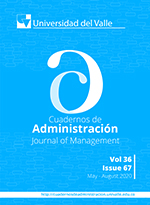Comprehensive Evaluation of Constructivist Methodologies from the Balanced Scorecard
Keywords:
Educational evaluation, Business administration, Higher education, Training method, MethodologyMain Article Content
It is common to evaluate university courses through the opinion of those involved in the training process, responding to a Likert-type evaluation format to synthesize teaching performance. This research arises with the intention of comprehensively evaluating the development of a course, including all the actors involved in the academic process. The main objective of this research is to determine the effectiveness of the constructivist training method in the business administration program, being evaluated from the Balanced Scorecard (CMI) and other administrative management tools; from the perspective of the student, the entrepreneur, the institution and teaching. For the validation of this tool, it is applied in a course in the process area (Process Management) and is replicated in those where the constructivist methodology is applied within the University. For the study, a quantitative and qualitative analysis was used, supported by surveys and a checklist, carried out and evaluated by students (38) and four businessmen. This research presents as main result a road map that helps the dynamics of the evaluation of education in an integral way in each university course and at the same time contributes to improve the performance of the different actors involved in higher education.
Downloads

This work is licensed under a Creative Commons Attribution-NonCommercial-NoDerivatives 4.0 International License.

